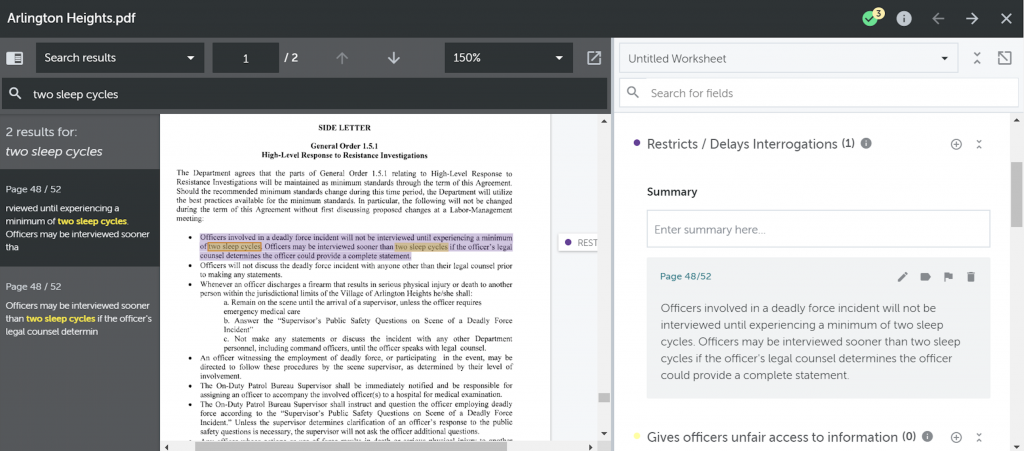Toronto-based software startup Kira Systems has partnered with Campaign Zero to support police reform discussions by providing access to hundreds of police contracts from across the United States via a new online database.
Kira and Campaign Zero plan to grant journalists access to these contracts via ‘Nix the 6,’ a recently launched smart database that leverages Kira’s contract management and analysis tech, and contains police union contracts and Law Enforcement Officer Bills of Rights (LEOBRs) obtained by Campaign Zero.
“We can systematically evaluate and dismantle these contracts that stifle reform, thus making it easier to pursue fundamental change.”
Campaign Zero is an American organization that advocates against police violence. It is focused on determining how police union contracts limit police accountability in cases of violence or abuse through its ‘Check the Police’ project. Using Kira’s software, the nonprofit reviewed over 600 police contracts from 20 US states including California, Florida, Illinois, and Louisiana, identifying six specific police contract clauses that it said raise accountability issues.
“We believe people make better decisions when they understand what’s in their contracts,” said Noah Waisberg, co-founder and CEO of Kira Systems. “That applies in the policy realm as well as the business world. This is an area where we, as a society, really need to make better decisions.”
Founded in 2011, Kira Systems is a contract review and analysis software startup that uses artificial intelligence (AI) and machine learning to extract key information from contracts and other similar documents.
Kira provided the technology behind the new database, which will be accessible to journalists to support their reporting and analysis. Campaign Zero plans to expand the database’s reach by using Kira’s API integration tools to extend the data to its own website, allowing others, like policymakers and stakeholders, to leverage the information it contains.
RELATED: Kira Systems receives $65 million CAD investment from New York’s Insight Venture Partners
According to Kira, the company’s software has already accelerated Campaign Zero’s document review process. Kira claims its tools, which allow users to highlight and group key contract provisions into fields, increased contract review efficiency by 70 percent.
“There is a hidden system of protections that almost guarantee that policing will not change and that officers will not be held accountable for their behavior,” said DeRay McKesson, co-founder of Campaign Zero. So far, the police reform organization said it has found six specific police contract clauses that raise accountability issues, and plans to highlight them in an upcoming campaign.
“‘Nix the 6’ is about breaking down the legal structures that enable police violence,” said McKesson. “Thanks to Kira’s machine learning software, we can systematically evaluate and dismantle these contracts that stifle reform, thus making it easier to pursue fundamental change.”

According to Campaign Zero, the six police contract clauses at issue concern short expiration dates on complaints, limited oversight and discipline of officers, erased misconduct records, police misconduct cases paid for with public funds, referential access to evidence for implicated officers, and unfair interrogation procedures.
“With Kira, we can use machine learning technology to review and code police contracts and policies at scale,” said Samuel Sinyangwe, co-founder of Campaign Zero. “By leveraging artificial intelligence, we can more quickly map the landscape of oppressive systems—and dismantle them.”
Kira’s software aims to hasten the contract review process, allowing users, from journalists to other interested parties, to quickly identify and compare relevant police contract terms and clauses. It will also include geographical filtering, permitting reporters to focus on local police contracts.
RELATED: Kira Systems uses machine learning to lead next generation of legal tech
Public discussion surrounding police reform intensified following the death of George Floyd in May, and associated, ongoing protests against anti-Black racism and police brutality.
For a 2017 article published in the Duke Law Journal, Stephen Rushin of Loyola University analyzed 178 police union contracts and found that 156 of them (approximately 88 percent) “contained at least one provision that could thwart legitimate disciplinary actions against officers engaged in misconduct.”
According to a review in the journal Police Practice and Research, “police scholars have neglected police unions.” However, existing research suggests “virtually all of the published items that express an opinion on the impact of police unions regard them as having a negative effect, particularly on innovation, accountability, and police-community relations.”
Kira’s patented software is used mainly in commercial contexts, such as in merger and acquisition due diligence reviews, knowledge management, lease abstraction, regulatory compliance, and “other projects where visibility into contract and document data is critical.” However, the company said it views accessible contract data as important in non-commercial environments like public policy, “where valuable insight is often hidden in hard-to-obtain public contracts.”
Beyond police reform, Kira anticipates opportunities to use AI and contract analysis to provide a stronger, data-driven basis for public policy decisions in other contexts. “We look forward to enabling lots more people—including advocates and activists, policymakers, academics, and journalists—in this important work,” the company said.
Images courtesy of Kira Systems


